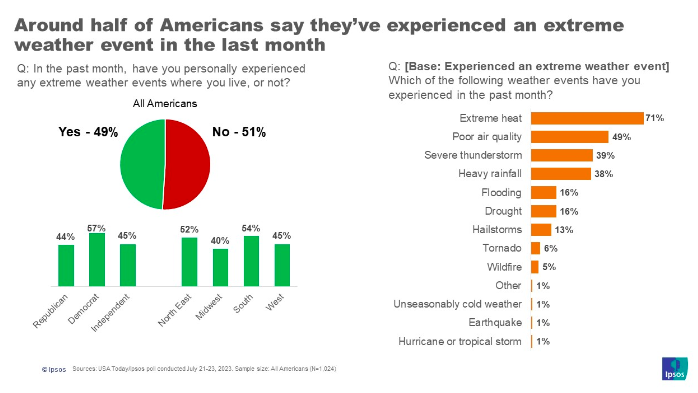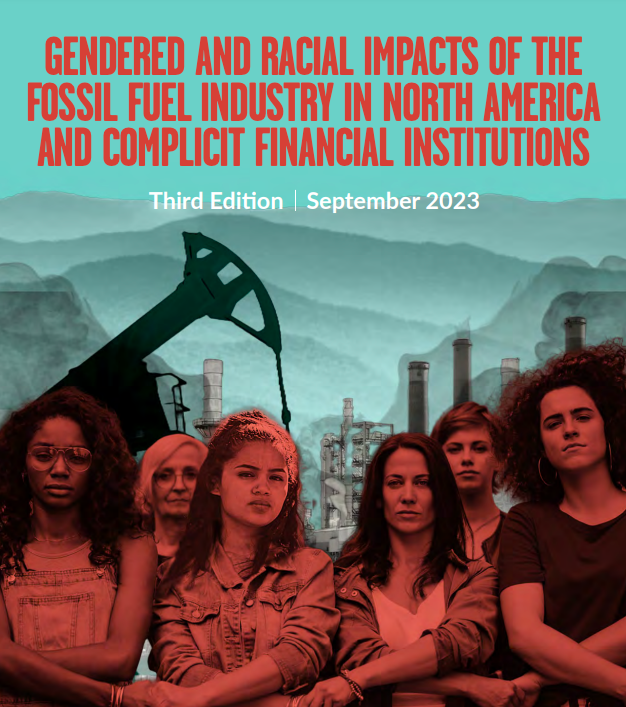Resources
Search below for resources covering the intersection of climate engagement, social science and data analytics.
RESULTS
Environmental Polling Roundup - October 27th, 2023
This post includes climate and environment headlines, data points, and key takeaways from recent public polls - including a new Pew report on Americans’ climate attitudes, a new analysis of pro-climate Republicans, and new polling on President Biden’s investments in clean energy and infrastructure.
Poll: Americans continue to have doubts about climate scientists’ understanding of climate change
Americans widely agree that climate change is harming people in the U.S. today and expect climate impacts to get worse in the future. Most trust that climate scientists understand the problem, despite doubts among Republicans. 75% of Americans recognize that human activity is contributing at least “some” to climate change. 71% of Americans agree that climate change is causing at least “some” harm to people in the U.S. today. 56% of Americans rate climate change as an “extremely” or “very” serious problem. 65% of Americans believe that climate scientists understand how climate change affects extreme weather events “very” or “fairly” well. 63% of Americans believe that climate scientists understand the causes of climate change “very” or “fairly” well.
What do Americans think is the biggest threat from global warming?
Americans have become more worried about and interested in global warming and started to perceive it as a greater risk in recent years. Americans were asked in a survey (in 2021): “What do you think is the greatest threat that global warming poses to the United States, if any?” The most common theme was Weather extremes and changes (20% of Americans), which included different types of extreme weather (e.g., floods, wildfires, droughts, hurricanes, extreme temperatures), changing weather patterns, and seasonal shifts. Many respondents in this category listed multiple extreme events, such as wildfires and droughts, or heat waves and flooding. The second most common theme was Global warming is not a threat (7%), which included statements about not being worried about climate change or expressing positions that raise doubts about climate science and scientists. The third most common themes were Pollution (6%), Other (6%), and Don’t know (6%). Respondents in the Pollution category mentioned specific pollution sources, such as “carbon dioxide,” “vehicle emissions,” or “waste disposal.”
Nearly nine in ten Americans say that they’ve experienced an extreme weather event, and extreme weather continues to shape Americans’ climate attitudes. 74% of Americans recognize that climate change is happening. 52% of Americans say they’ve become more concerned about climate change over the past year, while only 9% have become less concerned.
Environmental Polling Roundup - September 15th, 2023
This post includes climate and environment headlines, data points, and key takeaways from recent public polls - including new polling on support for climate justice policies, the EPA and FDA, climate impacts, and climate as a top priority among young people.
Majorities of Americans say that climate change is caused by humans and contributing to recent extreme weather events. 67% of Americans are concerned about climate change, including 41% who are “very” concerned. 59% of Americans believe that recent climate change is primarily caused by human activity. 58% of Americans believe that the extreme weather events in the United States over the past few years are related to climate change.
Environmental Polling Roundup - September 8th, 2023
This post includes climate and environment headlines, data points, and key takeaways from recent public polls - including new polling on Americans' beliefs about climate impacts in their areas and lifetimes and partisan polarization about beliefs about climate impacts.
Most Americans say that they’ve grown more concerned about climate change in recent years, as majorities say that extreme heat and unusual weather have become more frequent where they live. 69% of Americans say that they’re concerned about climate change. 68% of Americans recognize that extreme weather events will become more frequent in the near future. 53% of Americans say that they’ve become more concerned about climate change in the past few years, while only 10% say that they’ve become less concerned.
Gendered and Racial Impacts of the Fossil Fuel Industry in North America and Complicit Financial Institutions
This report finds an indisputable connection between the fossil fuel industry’s practices and negative impacts to African American/Black/ African Diaspora, Indigenous, Latina/Chicana, and low-income women’s health, safety, and human rights in the U.S. and parts of Canada. Specifically, fossil fuel-derived air, water, and soil pollution impact women’s fertility, mental health, and daily work and responsibilities. The negative effects from fossil fuel activity—including extraction, storage and transportation of coal, oil, and gas often in the form of liquefied natural gas (LNG)—stem from direct pollution of communities by fossil fuel companies’ contributions to industrial carbon dioxide and methane. The climate crisis does not and will not affect everyone equally, as factors such as gender, race, and socio-economic status make certain communities significantly more vulnerable to the increasing threats of climate change. Global inequalities, rooted in structural patriarchy, colonialism, white supremacy, and capitalism, continue to place people of the global majority, and specifically women, at risk.
Environmental Polling Roundup - August 25th, 2023
This post includes climate and environment headlines, data points, and key takeaways from recent public polls - including new polling on conservative groups' environmental ideas, extreme weather, messaging about climate justice, and western voters' conservation preferences.
Pagination
- Previous page
- Page 2
- Next page





